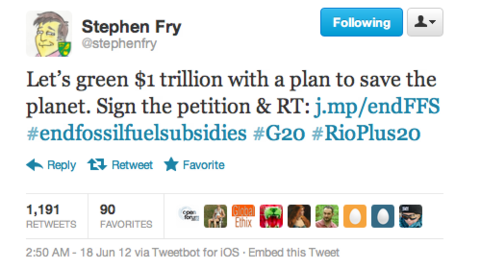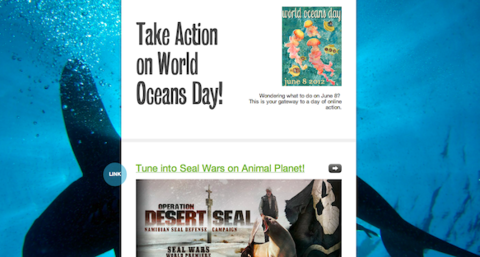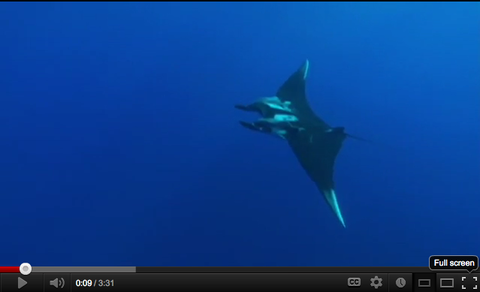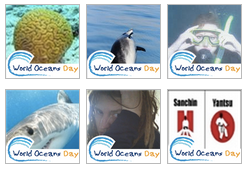Blog Feed
By The Numbers: Which Rio+20 Hashtag Should You Use?
To receive the most attention, Upwell recommends that you include both Rio+20 and the hashtag #RioPlus20.
Yes, that's more characters. But we have reasons.
Although the Rio+20 Conference doesn't officially begin until tomorrow, the online conversation about the conference has been underway for days. This is especially noticeable on Twitter, with celebrities like Stephen Fry and band Linkin Park mentioning the event. Unfortunately, the conference's name—specifically its problematic use of the "+" character—has created some confusion about which Twitter hashtag is the correct one to use.
What are hashtags, and who chooses them?
If you know this already, feel free to skip ahead.
For the unfamiliar, a hashtag is a word within a tweet prefixed with a hash (#) sign, designed to provide an easy way to mark a tweet as having to do with a given topic or event. Originally an informal convention proposed by an early Twitter user, hashtags quickly gained widespread acceptance, and are now a ubiquitous part of the Twitter experience. More importantly, most Twitter clients, including Twitter's own web client, automatically recognize hashtags, turning them into clickable links, which easily allow users to search for other mentions of a given hashtag. This is a powerful method of discovery, enabling readers to recognize and quickly dive into a larger conversation.
However, since hashtags are a wholly emergent phenomenon—there's no "Hashtag Council" deciding which tags become the official ones, for example—it's important that Twitter users study each conversation they intend to join in order to determine which tags (if any) are already in use.
The "+20" gets ignored.
In the case of the Rio+20 Conference, this process has been complicated by the "+" character smack dab in the middle of the event's name. Why? Because Twitter doesn't recognize special characters within hashtags. As far as Twitter is concerned, a hashtag begins with the '#' character, and ends when it reaches any non alphanumeric character. Thus, when someone includes "#Rio+20" in a tweet, Twitter only sees the characters before the "+" as a valid hashtag. That is to say, only "#Rio" (the "+20" just gets ignored).
While some Twitter users are aware of this quirk, many are not. Consequently, the hashtag landscape for Rio+20 has become unusually fragmented, with no fewer than ten different tags (both with and without the hash character) appearing in Rio+20 tweets.
So what should you use? Let's look at some data.
Data is our favorite.
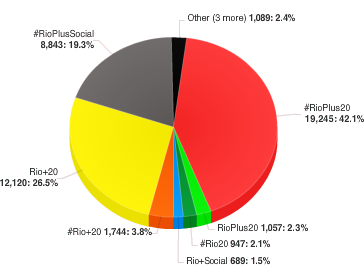
The chart above shows the total number of mentions/posts for the most popular Rio+20 hashtags in the past three days. Three tags are responsible for over 87% of the total volume.
- #RioPlus20 is the most popular tag, with 42% of the total volume and over 19,000 unique mentions. Note that, by writing out "+" as "plus", this tag neatly sidesteps the fragmented hashtag problem I described earlier.
- Rio+20 comes in second, with 26% of the total volume and 12,120 mentions. Technically, this is not a hashtag, as it isn't prepended by a "#" character, and its popularity is almost certainly due to people simply mentioning the name of the conference in their tweets.
- #RioPlusSocial is the third most popular tag, with 19% of volume and 8,843 mentions. (sidenote: This is a hashtag created by the conference organizers to foster a social conversation around sustainability. Why add another hashtag to the mix and further fragment the conversation? We don't know. Tell us in a comment if you do.)
Use them all.
Based on this, we recommend that you include both Rio+20 and the hashtag #RioPlus20 in your tweets. (And, if space permits, #RioPlusSocial as well.) Why all three? Take a look at the following graph:
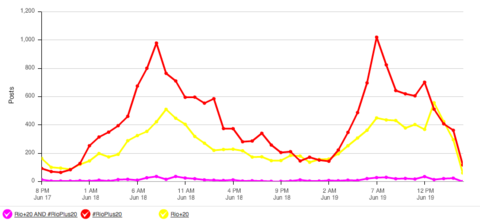
Although #RioPlus20 (red line) and Rio+20 (yellow line) are each very popular, very few tweets mention them together (magenta line). There are effectively three separate groups of people speaking about Rio+20 online: two that have purposefully organized (one around the hashtag #RioPlus20, and another around the hashtag #RioPlusSocial) and a third "group" that is simply speaking about the conference by its official name.
This isolation presents a great opportunity for clever attention campaigners. By crafting content that intentionally bridges these groups, not only will your tweets be more likely to receive broader attention, you will also be helping to make each group aware of the others, a move that could potentially bump the entire Rio+20 conversation up even higher.
Talking about #endfossilfuelsubsidies? Keep it up. (Updated)
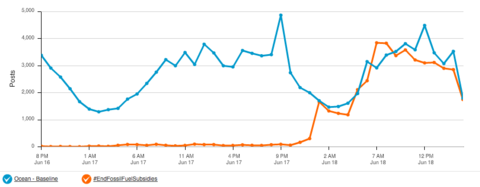
Social mentions in the U.S. June 16-18, 2012 for the Upwell "ocean" Keyword set (blue) and #EndFossilFuelSubsidies (orange)
Upwell's Network Strategist Aaron Muszalski says, "#endfossifuelsubsidies is getting the same amount of social mentions now as the ocean. Which is pretty awesome."
Why is this happening?
Engineering the Twitterstorm took days of advanced planning. 350.org recruited over 5,000 people to join a core "Twitter Team" designed to drive traffic at key moments throughout the day, as well as target celebrities with large twitter followings and key politicians. For over a week, people have been signing up at endfossilfuelsubsidies.org to get updates on the storm and get ready for the day of action.
We pay rather a lot of attention to how many people are talking about the ocean here at Upwell. The #EndFossilFuelSubsidies trend is likely (and predictably) falling off right now because our east coast pals are logging off for the evening. It could pick up again tomorrow. You, for example, could cause it to pick up tomorrow.
From the League of Conservation Voters:
Tweets with the hashtag #endfossilfuelsubsidies will be beamed onto global landmarks in Sydney, New Delhi, London, Rio and other locations. An offline petition for the campaign has already collected over a million signatures, and a Facebook event for the storm has drawn over 2,600 attendees.
A coordinated campaign to promote the hashtag #endfossilfuelsubsidies during the Rio+20 Earth Summit has taken the internet by storm today.
The online action began at 08:00 GMT and quickly skyrocketed to the #2 trend on Twitter worldwide. As sun rose in the United States, #endfossilfuelsubsidies was still trending at #3 across the country. By evening in Australia, as activists projected tweets at the Sydney Opera House, the hashtag was trending at #2.
As a team that cares about #oceanacidification, we say go team go!
Update June 19, 2012
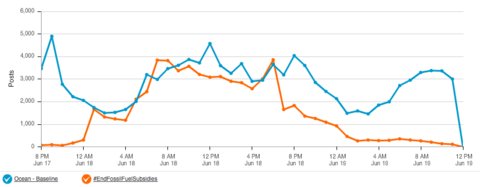
Social mentions in the U.S. June 16-19, 2012 for the Upwell "ocean" Keyword set (blue) and #EndFossilFuelSubsidies (orange)
The latest analysis shows nice focus through the end of the 24 hour Twitter storm. Big spike around 6pm PST to close out June 18, and a respectable bump that same evening at 8 pm.
World Oceans Day! Sea Signals from the week of June 4
Last Friday was World Oceans Day. Upwell had a busy week amplifying the efforts of the many organizations and individuals who contributed to the day of celebration.
#worldoceansday
Most of our World Oceans Day outreach happened by amplifying the #worldoceansday hashtag on twitter. We looked for interesting content being shared through social media channels and jumped into conversations that people were having about World Oceans Day. It was a full-time job to monitor the #worldoceansday hashtag, which bodes well. More people talking about the oceans? That’s our goal.
Here are the highlights:
- We helped spread the word by creating a compilation of all the online actions people could take for World Oceans Day, coming from organizations and individuals like The Ocean Project, One World One Ocean, The Nature Conservancy, NRDC, The Living Oceans Foundation, and more. We used Tumblr because it was the easiest way to collect different types of content from multiple sources in one place and keep it updated as more actions crossed our path.
- We reached out to individuals who were talking about what they could do for the oceans on Twitter and Facebook, directing them to this round-up. (Twitter outreach viewable on Topsy)
- We created and shared a YouTube playlist of videos curated from various organizations, and reached out to those organizations on Facebook and Twitter to let them know their videos were included. (Twitter outreach)
- We wrote a blog post on our own website to share the round-up, the playlist, and other ideas for celebrating World Oceans Day, and shared it via Facebook and Twitter. (Twitter outreach)
- We participated in and amplified @WhySharksMatter’s #OceanFacts conversation on Twitter. He asked people to post facts about the ocean for World Oceans Day and received hundreds of facts. He is currently developing a Storify to capture it (stay tuned...).
- We also reached out to celebrities and influencers who could potentially move the conversation to a bigger audience. Leonardo DiCaprio was vocal about World Oceans Day and was a prime target. We also targeted Alyssa Milano and Lady Gaga, who are active in conversing with their fans and followers. We were unsuccessful in gaining their attention.
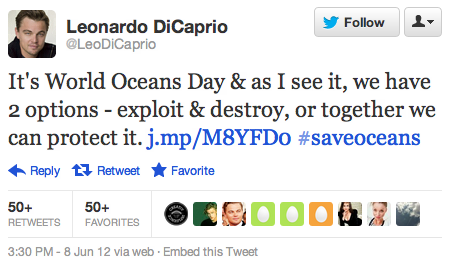
Through retweeting, mentions, and more, our #worldoceansday twitter activity had more than 100,000 impressions.
We Learned
There are commemorative holidays around every turn, from Foot Health Month (April) to World Water Day (March 22) to National Play-Dough Day (September 18) to World Toilet Day (November 19). While they provide good fodder for content, we were interested in using World Oceans Day to spark real action and conversation.
Of all the tweets we sent out, the most popular were inspirational and easily retweetable. This included quotes, interesting facts. Infographics were also popular. Our compilation and other tweets that encouraged action were less popular.
While we tried to focus on action by compiling all the things that people could do with the day, the link to our compilation was shared more than it was clicked. We’re learning how to increase social mentions of the ocean, and we were successful. However, measuring the action that came out of those mentions is a bit trickier.
Most retweets, shares and likes happened through the community of ocean organizations and individual ocean activists. One of the most successful tactics we used to broaden the conversation beyond this core group was to start up a conversation with people who weren’t already talking about World Oceans Day.
Successfully reaching out to celebrities requires an ability to cut through the noise. Something to consider for the future would be to ask numerous people to echo your ask to an internet influencer or celebrity. If they hear it from multiple voices, it is far more likely that they will act.
Odwalla & Ocean Conservancy
For each person who takes the pledge on Causes to do 1 good thing for the planet, Odwalla will donate $1 to Ocean Conservancy, up to $20,000, in support of their ongoing programs. (Full disclosure: Upwell is incubated by Ocean Conservancy).
Amplification & Reaction
In order to reach folks outside of the ocean community, we searched on Twitter for people who had tweeted any of the following words, or phrases: love Odwalla, love ocean, Odwalla, #Odwalla, for the planet, for our planet, Earth Day, #Earthday, World Environment Day, #WED2012, and green. From our search results, we looked for people whose profiles and tweets indicated an interest in environmental topics, but who weren’t affiliated with an ocean conservation organization. We let them know about the fundraiser.
Upwell’s Twitter account received a new follower out of the outreach, but none of the people we tweeted replied to our tweets, RT’d them, or favorited them.
We Learned
We’re left with the question: Is it possible for Upwell to spread the word about ocean-related fundraisers if the people we’re reaching out to aren’t necessarily familiar with the organization’s work?
Living Oceans Foundation Webinars
After we included a photo from the Living Oceans Foundation in our Goliath Grouper Pinterest Board, they reached out and asked us to help spread the word about their World Oceans Day webinars about the Galápagos Islands, coral and climate change. We said, “We’d love to!”
Amplification & Reaction
We searched Twitter for people who had recently tweeted about Galápagos, coral, climate change, or the recent The New York Times article, “In the Galápagos Islands, a Bigger Center for Divers.” Of the five people we tweeted about the webinars, three them of them shared, or RT our tweet. Two of the three began following @LivingOceansFdn.
We also sent out a tweet about the webinars to all of Upwell’s followers. One tweet included info about the webinars, and one included info about the webinars + a link to a video by Living Oceans Foundation of a whale shark in the Galápagos. One person RT’d the tweet with just the webinar info, and one tweeted about the webinar + video.
If all of the followers of everyone who shared our tweets about the webinars saw them, we would have reached about 21,600 people.
We also shared the video on the Upwell Facebook Page where 42% of the people who liked our page saw it.
Finally, we left a comment on The New York Times article, “In the Galápagos Islands, a Bigger Center for Divers,” with information about the webinar, and a full disclosure that we were with a nonprofit social media pr agency that amplifies ocean stories. They didn’t publish the comment.
We Learned
- It's difficult to fit a lot into a tweet when you have to include the person you’re sending the tweet to, a hashtag (#worldoceansday), and a bitly link (for the webinar info page)
- When you send a tweet directly to someone, don't follow their user name with another user name, or it looks like they're part of the tweet. (e.g. @bbravo @livingoceansfdn is having 2 free #WorldOceansDay webinars re: Galápagos #coral + #climatechange http://bit.ly/L8iN2A). Instead, try using TYMLTK (thought you might like to know) to separate user names
- It was difficult to find people who were tweeting about the Galápagos, coral, climate change, or the NYT article who weren't ocean conservation organizations, were individuals with over 300 followers, and whose profile and tweets indicated that they might be interested in the webinars’ topics.
- Sadly, it doesn’t pay to disclose you are from a nonprofit social media PR firm in the comments of The New York Times.
Something else Jacques Cousteau did on his birthday
Today is the 102nd birthday of famed explorer, Jacques-Yves Cousteau. Happy birthday Jacques, from your admirers at Upwell.
On the shelves of our North Beach office live a collection of books about social change, online metrics, and of course, the ocean. Our library would not be complete without Monsieur Cousteau.

The Ocean World of Jacques Cousteau is an encyclopedia of marine life forms, published in the 70s, a companion to the television series that brought the wonder of undersea exploration to the masses. There's nothing like old encyclopedias to call up our nostalgia. As children, we'd pull the books off the shelves to learn something new, rather than pulling our phones out of our pockets.
And then there's Jacques' memoir, The Silent World, which recounts the first days of scuba diving with wit, courage and humor. The Upwell team sat down with the book for lunch today. We took turns storytelling, using our best Cousteau accents.
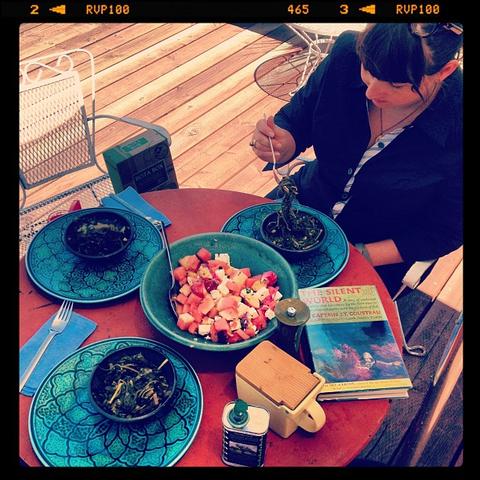
Imagine our surprise upon coming to this page, midway through the book.
On this day - June 11 - 69 years ago, just as Jacques was turning 33, he avoided deportation through a bit of cleverness.
When the Allies landed in Normandy in 1944 I left Paris by bike to join my family in the Alps, 500 miles away. I carried 110 pounds of food, wine, and documents and made it in four days, pushing up mountain trails to avoid German and maquis skirmishes. The official wartime work card that saved me several times from deportation to Germany. The first side was made out by my employer, Jacque-Yves Cousteau, producer of scientific films. The other side said that he employed Jacques-Yves Cousteau to direct the films.
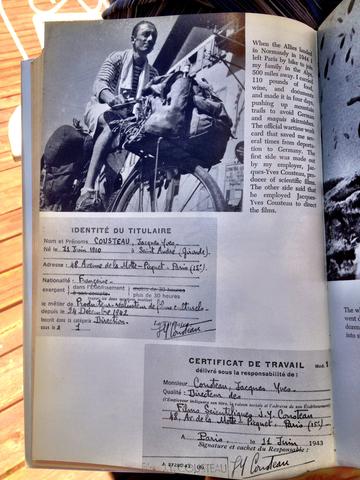
Jacques Yves Cousteau once said, "If we were logical, the future would be bleak, indeed. But we are more than logical. We are human beings, and we have faith, and we have hope, and we can work."
Keeping that in mind, Upwell gets back to work.
5 Ways to Celebrate World Oceans Day
We’re just a few days away from World Oceans Day (June 8). Below are 5 ways you can celebrate, and help spread the word:
Watch
Act
Tweet
Eat
Rally
WATCH
Take a break and watch this collection of 17 short YouTube videos about manta rays, porpoises, sharks, surfing, otter pups, whale songs, Google Earth’s 3D Ocean and more!
ACT
Beach cleanups, online contests, photo sharing - there's lots of ways to get involved. Take your pick, or do them all!
TWEET
Add a Twibbon to your profile picture on twitter to show your support:
Be sure to include #WorldOceansDay in your tweet!
I love the ocean! Celebrate with me on June 8th #WorldOceansDay
Celebrate the ocean June 8th! See the events near you: www.WorldOceansDay.org/events #WorldOceansDay
Did you know June 8th is World Oceans Day? #WorldOceansDay
EAT
Make or order some delicious + sustainable seafood. Get inspired by the Sea•thos Foundation’s Sustainable Seafood Recipes Pinterest Board, and browse the Monterey Bay Aquarium’s sustainable seafood recommendations.
RALLY
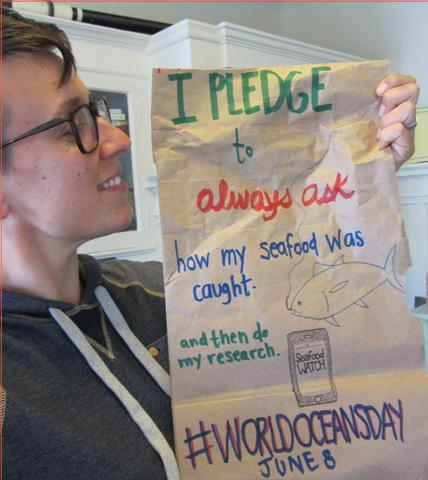
Take a photo of yourself with a sign that says one thing you’ll do to help the ocean. Encourage your friends, family and co-workers to do the same. You can share it on:
- Facebook, and tag the World Oceans Day Facebook Page.
- Twitter. Be sure to tag it with #WorldOceansDay, and tag @CelebrateOceans
- Flickr. Upload it to the World Oceans Day Group.
- Instagram. Tag it with #WorldOceansDay, and share on Facebook and Twitter.
